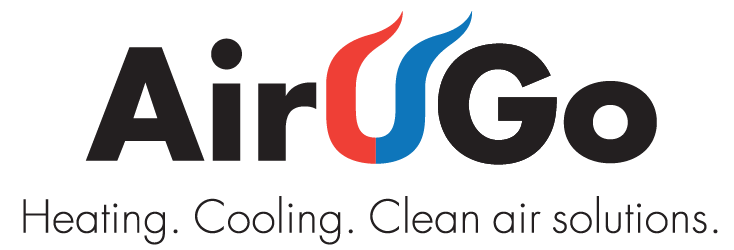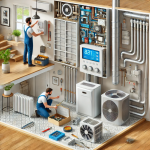Maintaining your home heating system is crucial for ensuring efficiency, longevity, and optimal performance, especially during the colder months. Regular maintenance not only helps keep your home warm and comfortable but also reduces energy bills and prevents costly repairs. This comprehensive guide will walk you through essential home heating maintenance tips to keep your system running smoothly year-round.
Why Regular Heating Maintenance is Important
Proper heating maintenance should never be overlooked. Over time, heating systems can wear down, reducing their efficiency and leading to potential malfunctions. Performing regular maintenance has numerous benefits, including:
- Improved Efficiency: Well-maintained heating systems operate more efficiently, consuming less energy and lowering utility costs.
- Extended Lifespan: Regular upkeep helps prolong the life of your heating system, saving you from the expense of premature replacement.
- Reduced Repairs: Addressing minor issues before they escalate prevents expensive emergency repairs.
- Enhanced Safety: A properly maintained system reduces the risk of dangerous malfunctions like gas leaks or carbon monoxide emissions.
- Optimal Performance: A well-maintained system provides consistent and reliable heating throughout your home.
Now, let’s dive into specific maintenance tips to ensure your heating system operates at its best.
1. Schedule Annual Professional Inspections
Why Annual Inspections Matter
One of the most important steps in maintaining your home heating system is scheduling an annual inspection by a certified HVAC technician. Professionals are trained to identify potential issues that the average homeowner may overlook. During an inspection, the technician will:
- Check for leaks in gas lines and ducts.
- Test efficiency levels to ensure the system is operating optimally.
- Inspect wiring and components for wear and tear.
- Clean components like filters and burners, which may accumulate dirt and debris over time.
What to Expect from an Inspection
An annual inspection typically includes a thorough check of your heating system’s key components:
- Thermostat Calibration: Ensuring the thermostat is accurate and responding to temperature changes.
- Air Filter Replacement: Clean or replace dirty air filters that block airflow and reduce efficiency.
- Ductwork Examination: Ensuring there are no obstructions or leaks in your home’s ductwork that could reduce heating performance.
- Safety Checks: Ensuring there are no safety hazards, such as faulty wiring or gas leaks.
2. Replace Air Filters Regularly
How Air Filters Affect Efficiency
Air filters play a crucial role in maintaining airflow throughout your heating system. Dirty or clogged filters reduce airflow, forcing your system to work harder and use more energy. This not only increases energy costs but also shortens the lifespan of the system.
How Often Should Filters Be Replaced?
Replacing air filters regularly is one of the easiest and most cost-effective ways to improve your system’s efficiency. Here’s how often you should consider replacing your filters:
- Every 1-3 months: For homes with pets, smokers, or allergy sufferers.
- Every 6 months: For homes without pets and minimal indoor air pollutants.
Steps for Replacing Air Filters
- Turn off the system to ensure safety.
- Locate the filter compartment, typically near the air handler or furnace.
- Remove the old filter and dispose of it.
- Insert the new filter, ensuring it fits securely and aligns with the airflow arrows.
- Turn the system back on.
3. Clean and Maintain Vents and Ductwork
Importance of Clean Ductwork
Dust, dirt, and debris can accumulate in your home’s ductwork over time, reducing airflow and heating efficiency. Regularly cleaning your ducts and vents can improve air quality and ensure consistent heat distribution throughout your home.
How to Clean Vents and Ducts
- Vacuum: Use a vacuum cleaner with a hose attachment to remove dust and debris from vents.
- Check for Blockages: Ensure furniture or other objects aren’t obstructing vents, as this can hinder airflow.
- Inspect for Leaks: If you notice any signs of damage or leaks in the ductwork, it’s essential to address these issues to prevent energy loss.
4. Test Your Thermostat
How Thermostats Affect Efficiency
A malfunctioning thermostat can lead to inconsistent heating and wasted energy. It’s important to regularly test your thermostat to ensure it’s accurate and responsive to temperature changes. Here are some tips for maintaining your thermostat:
- Test the settings: Switch between heating and cooling modes to check that the system responds appropriately.
- Replace batteries: If you have a battery-powered thermostat, replace the batteries at least once a year.
- Upgrade to a programmable thermostat: Consider upgrading to a programmable or smart thermostat, which allows you to set heating schedules, optimizing energy usage based on your routine.
5. Check Carbon Monoxide Detectors
Why Carbon Monoxide Safety is Critical
If your heating system relies on natural gas, propane, or oil, there’s always the risk of carbon monoxide leaks. Carbon monoxide is an odorless, colorless gas that can be deadly in high concentrations, so it’s crucial to install and regularly check carbon monoxide detectors throughout your home.
How to Maintain Carbon Monoxide Detectors
- Test detectors monthly to ensure they’re functioning properly.
- Replace batteries annually or when you hear the low-battery warning.
- Replace detectors every 5-7 years, depending on the manufacturer’s recommendations.
6. Keep Outdoor Units Clear
Why Clearance Around the Unit Matters
If your home heating system includes an outdoor heat pump or condenser unit, it’s important to keep the area around the unit free of debris, snow, and ice. Obstructions can block airflow and cause the system to work harder, leading to increased energy consumption and potential damage.
How to Maintain Outdoor Units
- Clear away leaves, snow, and debris: Regularly check the area around your outdoor unit and remove any debris that could block airflow.
- Trim vegetation: Ensure there’s at least 2 feet of clearance around the unit by trimming back bushes, shrubs, or other plants.
- Check for damage: Inspect the unit for signs of physical damage, such as bent fins or leaks, and contact a professional for repairs if needed.
7. Bleed Radiators (For Radiator Systems)
Why Bleeding Radiators is Essential
For homes with radiator heating systems, air can sometimes become trapped in the radiators, reducing their efficiency and ability to provide heat. Bleeding the radiators releases trapped air and allows hot water to circulate more effectively, improving the system’s performance.
How to Bleed a Radiator
- Turn off the heating: Allow the radiators to cool before proceeding.
- Locate the bleed valve: It’s typically located at the top of the radiator.
- Use a radiator key: Insert the key into the valve and turn it counterclockwise.
- Release air: You’ll hear a hissing sound as air escapes. Once water starts to drip from the valve, tighten the valve to stop the flow.
8. Monitor Energy Bills for Unusual Spikes
Why Monitoring Bills is Important
Keeping an eye on your energy bills can alert you to potential problems with your heating system. If you notice an unexpected spike in energy usage without a corresponding increase in heating demands, it may be a sign that your system isn’t running efficiently.
What to Do If You Notice a Spike
- Schedule an inspection: Have a professional check your system for issues such as dirty filters, faulty components, or duct leaks.
- Upgrade old systems: If your heating system is outdated, consider upgrading to a more energy-efficient model.
Conclusion
By following these home heating maintenance tips, you can ensure your system operates efficiently, reliably, and safely throughout the year. Regular maintenance not only saves you money on energy bills but also extends the lifespan of your heating system and reduces the need for costly repairs. Prioritizing maintenance will help you stay comfortable during even the coldest months, giving you peace of mind that your heating system is functioning at its best.

